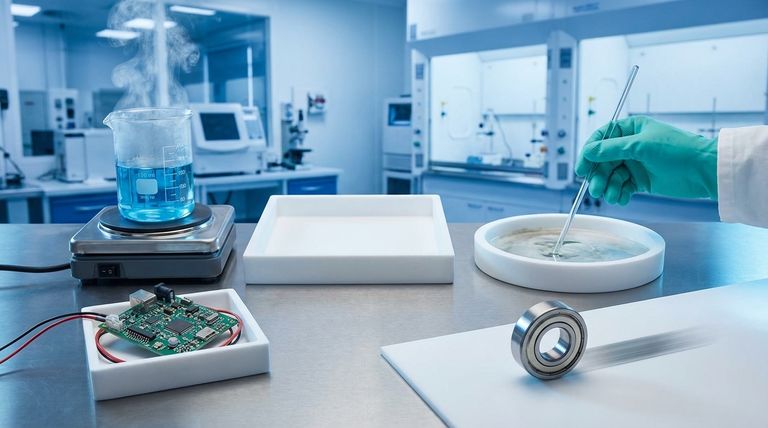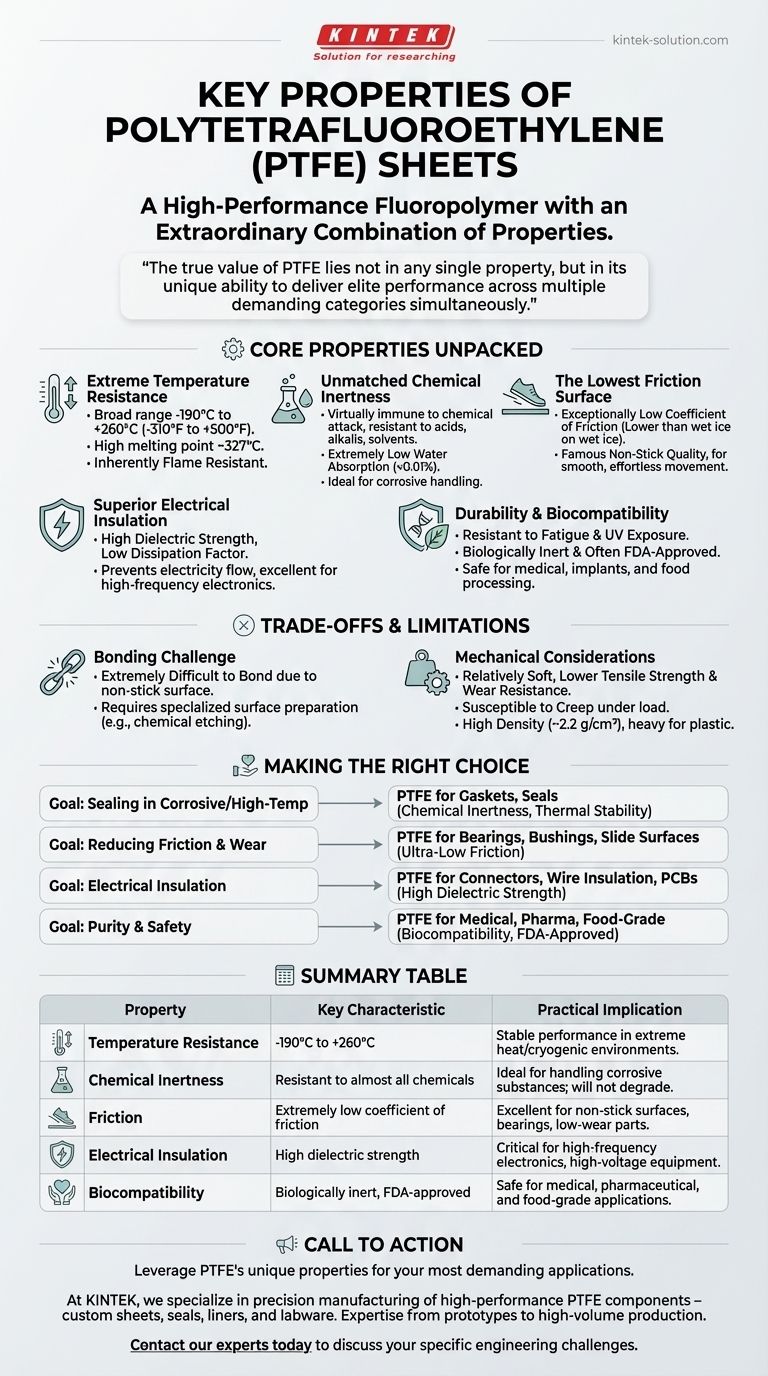At its core, Polytetrafluoroethylene (PTFE) is a high-performance fluoropolymer known for an extraordinary combination of properties. Its defining characteristics include extreme thermal stability from cryogenic levels to over 260°C, near-total chemical inertness, one of the lowest coefficients of friction of any solid, and excellent electrical insulation.
The true value of PTFE lies not in any single property, but in its unique ability to deliver elite performance across multiple demanding categories simultaneously. Understanding this combination is key to leveraging it effectively in engineering and industrial applications.

Unpacking the Core Properties of PTFE
To fully grasp PTFE's capabilities, we must examine each of its primary characteristics and understand their practical implications.
Extreme Temperature Resistance
PTFE maintains its properties across an exceptionally broad temperature range, typically from -190°C to +260°C (-310°F to +500°F).
Its high melting point of around 327°C (620°F) ensures stability in high-heat applications where other plastics would fail. It is also inherently flame resistant, often carrying a UL94 V-0 rating.
Unmatched Chemical Inertness
PTFE is virtually immune to chemical attack. It is highly resistant to almost all acids, alkalis, bases, and organic solvents.
This remarkable inertness, combined with extremely low water absorption (<0.01%), makes it an ideal material for handling corrosive substances in chemical processing, and ensures it will not degrade from environmental exposure.
The Lowest Friction Surface
PTFE has an exceptionally low coefficient of friction—one of the lowest values recorded for any solid material, even lower than wet ice on wet ice.
This results in its famous non-stick quality, which is critical for applications like low-friction bearings, slide plates, and non-stick coatings where smooth, effortless movement is required.
Superior Electrical Insulation
As an excellent electrical insulator, PTFE exhibits high dielectric strength and a low dissipation factor.
This means it can effectively prevent the flow of electricity, making it a first-choice material for high-frequency electronics, cable insulation, and components in high-voltage equipment.
Durability and Biocompatibility
PTFE is resistant to fatigue and does not degrade from UV exposure, giving it a long, low-maintenance service life.
Furthermore, it is biologically inert and often FDA-approved, making it a safe and reliable choice for use in medical devices, surgical implants, and food processing equipment.
Understanding the Trade-offs and Limitations
No material is perfect. While PTFE's properties are extraordinary, they come with important limitations that must be considered during design and application.
The Challenge of Bonding
The same low-friction, non-stick surface that makes PTFE so valuable also makes it extremely difficult to bond to other materials using conventional adhesives.
Successfully bonding PTFE typically requires specialized and costly surface preparation techniques, such as chemical etching, to create a bondable surface.
Mechanical Considerations
While durable, PTFE is a relatively soft material with lower tensile strength and wear resistance compared to other engineering plastics.
It can be susceptible to creep (the tendency to slowly deform under a constant load) and abrasion. Its high density of up to 2.2 g/cm³ also makes it one of the heavier plastics, which can be a factor in weight-sensitive designs.
Making the Right Choice for Your Application
Selecting PTFE is about matching its unique profile to a specific engineering challenge. Your primary goal will determine if its strengths outweigh its limitations.
- If your primary focus is sealing in corrosive or high-temperature environments: PTFE's chemical inertness and thermal stability make it the ideal choice for gaskets and seals.
- If your primary focus is reducing friction and wear: Its ultra-low coefficient of friction is perfect for bearings, bushings, and slide surfaces.
- If your primary focus is electrical insulation: PTFE's high dielectric strength is critical for high-frequency connectors, wire insulation, and printed circuit boards.
- If your primary focus is purity and safety: Its biocompatibility and FDA-approved status are essential for medical, pharmaceutical, and food-grade applications.
Ultimately, PTFE is the definitive material choice for environments where other materials simply cannot survive.
Summary Table:
| Property | Key Characteristic | Practical Implication |
|---|---|---|
| Temperature Resistance | -190°C to +260°C | Stable performance in extreme heat and cryogenic environments. |
| Chemical Inertness | Resistant to almost all chemicals | Ideal for handling corrosive substances; will not degrade. |
| Friction | Extremely low coefficient of friction | Excellent for non-stick surfaces, bearings, and low-wear parts. |
| Electrical Insulation | High dielectric strength | Critical for high-frequency electronics and high-voltage equipment. |
| Biocompatibility | Biologically inert, FDA-approved | Safe for medical, pharmaceutical, and food-grade applications. |
Leverage PTFE's unique properties for your most demanding applications.
At KINTEK, we specialize in the precision manufacturing of high-performance PTFE components—including custom sheets, seals, liners, and labware. Whether you're in the semiconductor, medical, laboratory, or industrial sector, our expertise ensures you get the exact PTFE solution you need, from prototypes to high-volume production.
Contact our experts today to discuss how our PTFE components can solve your specific engineering challenges.
Visual Guide

Related Products
- Custom PTFE Parts Manufacturer for Teflon Containers and Components
- Custom PTFE Parts Manufacturer for Teflon Parts and PTFE Tweezers
- Custom PTFE Sleeves and Hollow Rods for Advanced Applications
- Custom PTFE Sealing Tapes for Industrial and High Tech Applications
- Custom PTFE Square Trays for Industrial and Laboratory Use
People Also Ask
- What are some applications of CNC machined PTFE parts? Critical Components for Medical, Electrical & Food Industries
- How does PTFE compare to other low-friction plastics like UHMW-PE and Nylon? A Guide to Material Selection
- How is PTFE used in industrial processes? Maximize Safety and Efficiency
- Why is PTFE considered a significant discovery? A Material That Revolutionized Industry
- What are some important physical property values for PTFE? Master Its Extreme Performance for Demanding Applications



















